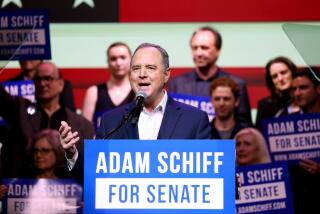Opinion: At last, a real challenger for Dianne Feinstein’s Senate seat
Now it’s a race.
With California Senate leader Kevin de León (D-Los Angeles) now officially a candidate for the U.S. Senate, incumbent Dianne Feinstein has a serious challenger for the first time in more than two decades.
Not since her 1994 race against Arianna Huffington’s then-husband Michael (remember him?) has Feinstein had to really worry about winning a campaign — and maybe not even then. Sure, the California Republicans put up their best efforts to unseat her in 2000, 2006 and 2012, but with state GOP registration on a steady downward march and Feinstein with the incumbent’s advantage — losing to a Republican was never a serious proposition.
So 2018 might have been another easy reelection had not someone from her own party broken with tradition to challenge her.
Feinstein is one of my political heroes, but I’m glad to see another Democrat in this race. Nobody owns an elective seat, and party leaders shouldn’t get to dictate who can run for a seat and when they can do it. Serving in public office is a privilege and every candidate — even those with long and distinguished track records — should have to prove to voters they are the best person for the job in every election.
We can largely thank Proposition 14 — the top-two primary system passed by voters in 2010 — for making De León’s challenge possible. Until just recently, it would have been nuts to take on a sitting senator from the same party, especially one so highly respected as Feinstein. It’s a lot less of a gamble now because the top-two vote getters advance to the runoff regardless of party affiliation. For candidates with appeal to voters beyond their own party’s base, this means a real shot at victory in the general election.
As you can imagine, political parties aren’t huge fans of the top-two system, derisively referring to as a “jungle primary.” For the California GOP, it means a harder time getting candidates into runoff races for statewide elections. For Democrats, it means expensive and divisive intraparty political battles.
But competitive races are worth the hassle and cost. Think of how last year’s U.S. Senate race might have gone if Rep. Loretta Sanchez hadn’t challenged Kamala Harris? Without a Democratic challenger, it would have been an anointment of Harris (sorry Republicans, it’s true). In the end it was a better race for voters and perhaps it made Harris a better senator.
This will be a better Senate race as well, with healthy and vigorous debate forcing candidates to take clear positions on issues that Californians care about. That can’t help but increase the odds that whoever wins — the incumbent or one of her rivals — will be a better senator for it.
Follow me @marielgarzaLAT
More to Read
A cure for the common opinion
Get thought-provoking perspectives with our weekly newsletter.
You may occasionally receive promotional content from the Los Angeles Times.







